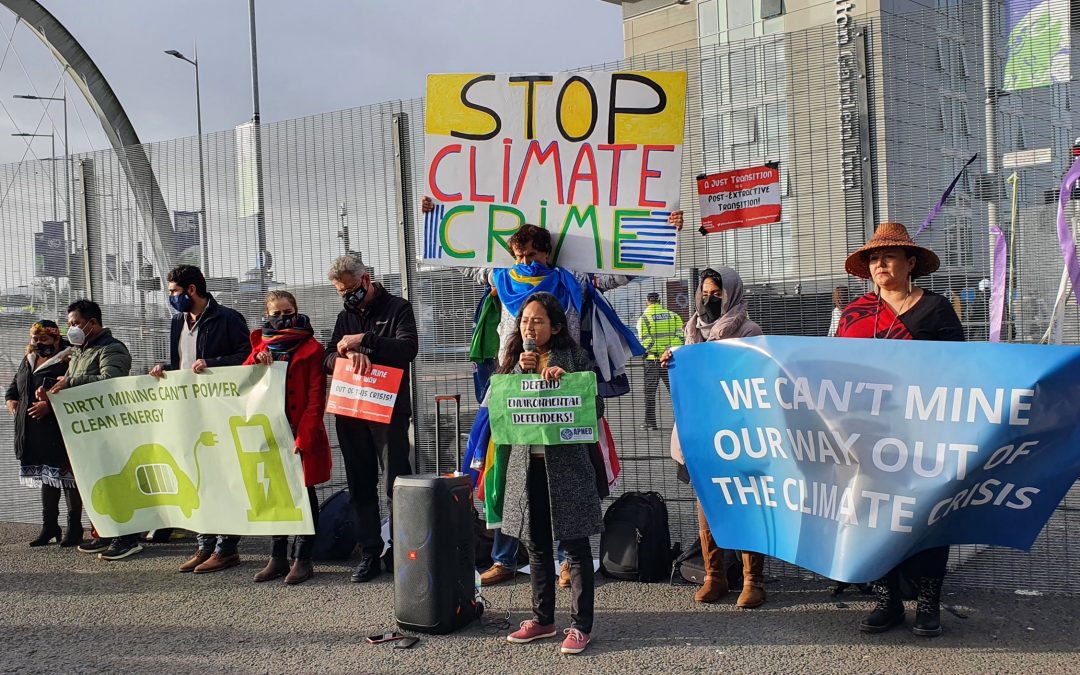This article was originally published in südostasien, a German magazine focused on amplifying voices on and from Southeast Asia on economic, political, and cultural issues. Read the piece in German here.
by Tala Batangan, Reality of Aid-Asia Pacific
The urban poor, rural and coastal communities of Southeast Asia are exposed to the threats of climate change, such as extreme weather events and rising sea levels. Disproportionately impacted by the climate emergency, countries in the region suffer from loss of human lives, displacement, economic slowdown, and food insecurity. In th
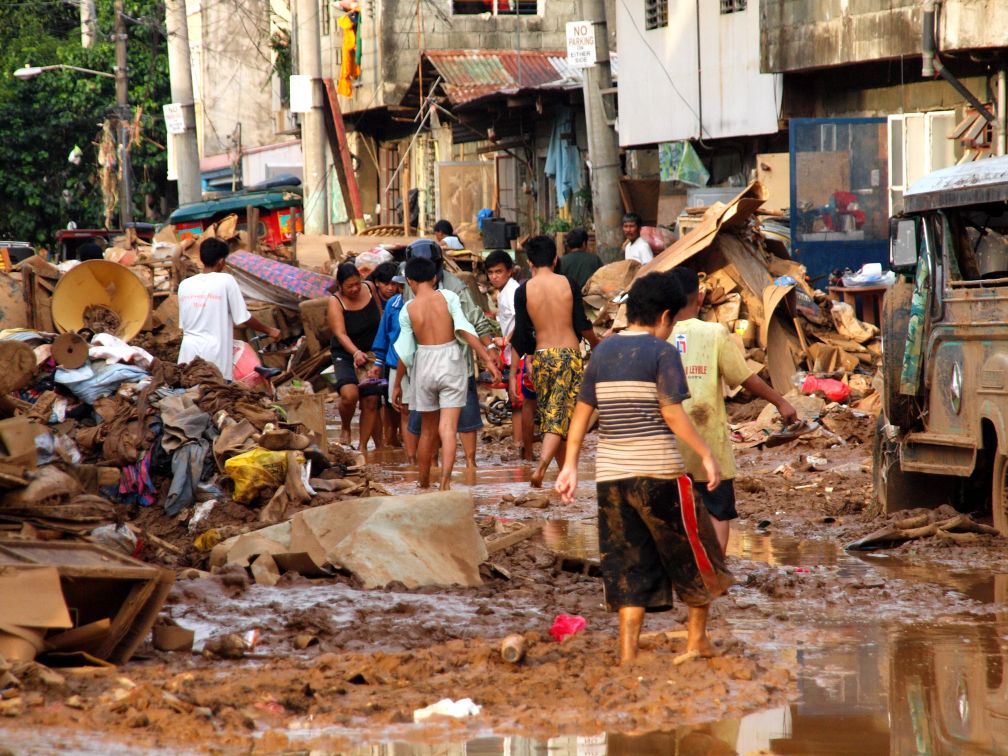
Flooded urban poor area in Metro Manila. / Wikimedia Commons
is context, Southeast Asia critically needs resources in order to adapt and mitigate the impacts of the climate emergency, in order to adequately save people’s lives, ensure livelihoods, alleviate poverty and conserve the environment.
Southeast Asian countries have been at the receiving end of climate finance or the provision of developed countries of “new and additional financial resources that meet the agreed full costs [of climate change and decarbonisation] incurred by developing country parties.” Developed countries have committed to disburse USD 100 billion a year by 2020 as climate finance, which was extended to 2023 due to the failure to realize these pledges.
Financialization of climate finance
From 2000 to 2019, countries in the region received a total climate finance of USD 56 billion, which only amounts to USD 4 per person annually. Obviously lacking, climate financing in the region creates disparities as Indonesia, Philippines and Vietnam get the bulk of these funds and are concentrated to fund the transport, energy and agriculture sectors. Furthermore, while a total of USD 28.37 billion is provided for the region’s mitigation measures, only USD 10.42 billion is given to adaptation programs that are crucial for countries’ response to and recovery from natural disasters.
The financing gap, which is largely caused by donors’ failure to reach their commitments, has led to the financialization of climate finance through increased lending from the financial institutions and the private sector. This can be seen in the promotion of green bonds and guarantees through financing facilities, spearheaded by international financial institutions (IFIs) like the International Monetary Fund-World Bank (IMF-WB), Asian Development Bank (ADB) and the Asian Infrastructure Investment Bank (AIIB) operating in the region. While corporations are able to extract profit from climate loans and their promotion of false, market-based solutions, developing countries are burdened with additional debt, leading to budget cuts for essential social services and climate initiatives.
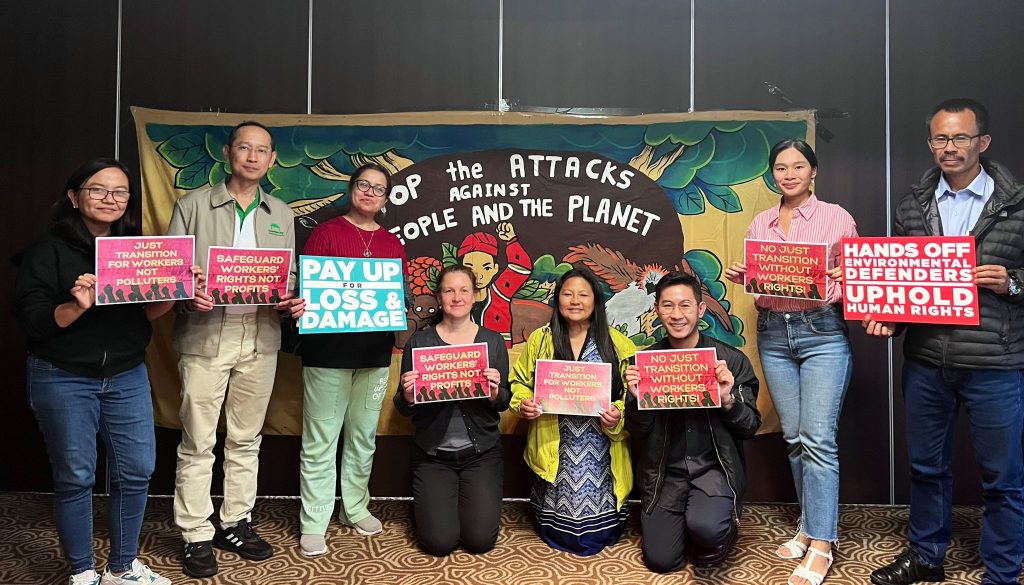
Asia-Pacific CSOs call for a people-centered, rights-based, and climate-resilient development at the sidelines of the Asian Development Bank Annual Meeting. / Reality of Aid-Asia Pacific
Green bonds, or “financial instruments that finance green projects and provide investors with regular or fixed income payments,” are increasingly utilized to mobilize financing for projects addressing impacts of climate change while providing tax incentives for investors. In the Philippines, the first green bond issued amounting to USD 225 million was by AP Renewables Inc. (APRI), a subsidiary of Aboitiz Power Corporation, for the rehabilitation of the Tiwi-MakBan geothermal energy facilities in 2016. The ADB provided an additional loan of USD 37.89 million for credit enhancement.
The Tiwi-MakBan facilities were originally public assets but were privatized and acquired by APRI, and are now being operated by SM Investments Corporation (SMIC), as an attempt for the corporation to offset the carbon emissions from their business activities. The bonds boosted business operations of the APRI and SMIC, part of the largest conglomerates and owned by the richest families in the Philippines, with a respective net worth of USD 12.6 billion and USD 2.9 billion in 2022, while the country accumulated USD 215 billion in debt.
Meanwhile, in Indonesia, the USD 95 million green bond issued for the Royal Lestari Utama project, an initiative that promotes “sustainable natural rubber production” under Michelin and Barito Pacific, was used to destroy almost 8,500 hectares of forest land. The project has led to massive deforestation to make way for rubber plantations, along with the loss of biodiversity and threats to people’s livelihoods. The project initially declared it would contribute to reforestation, but underlying the project is the aim to efficiently increase rubber production in Indonesia, under Michelin and its local partner, Barito Pacific, which belongs to one of Indonesia’s largest conglomerates that has historically contributed to massive environmental destruction.
Continuing colonial legacies
The underlying structures where climate finance rests remains to be driven by unequal power relations among states, rooted in the exploitation by previous colonial powers of the global South. This can be seen with persistence of climate colonialism or imperialism, which translates to how the “climate crisis is an extension of colonialism’s extractive model.” For Southeast Asian countries that underwent centuries of colonization and exploitation, central to climate finance is the historical commitment of former colonial powers, now developed and industrialized countries, to finance climate mitigation and adaptation measures of developing countries.
The existing architecture of climate finance highlights the diversity of flows from bilateral and multilateral channels, with separate funds and pools of financing for certain programs and countries. Donors and corporations have perpetuated a system that ensures their provisions for climate finance circle back to their economies, with the promotion of loans and market-based climate solutions. With this, critical funding remains out of reach for frontline communities facing the worst of the climate crisis.
Furthermore, as communities amplify the negative impacts of climate initiatives, with the shrinking civic space in the region, they are subjected to increased attacks and threats to their lives and rights. In Southeast Asia, the Philippines remains to be the deadliest country for environmental defenders. In 2019, 43 environmental defenders, who largely opposed harmful logging, dam and mining projects, were killed by armed forces. In Vietnam, the environmental lawyer Dang Dinh Bach, who has led energy transition and climate initiatives in the country, has been unjustly detained by the government.
To decolonize and democratize
The climate justice movement in Southeast Asia and the rest of the global South continues to call for the decolonization of climate finance, which requires the fundamental shift of power and resources to genuinely address the climate crisis. This would allow developing countries and frontline communities access to climate financing that would be aligned with their own development priorities and needs. Decolonization entails rejecting neoliberal, market-based and privatized approaches for climate and development, while privileging localized approaches and indigenous knowledge in addressing climate change, as well as promoting the democratic ownership over decision-making, systems and resources. There is also an immediate need to anchor climate finance on the four development effectiveness principles of democratic country ownership, focus on results, inclusive partnerships and mutual transparency and accountability.
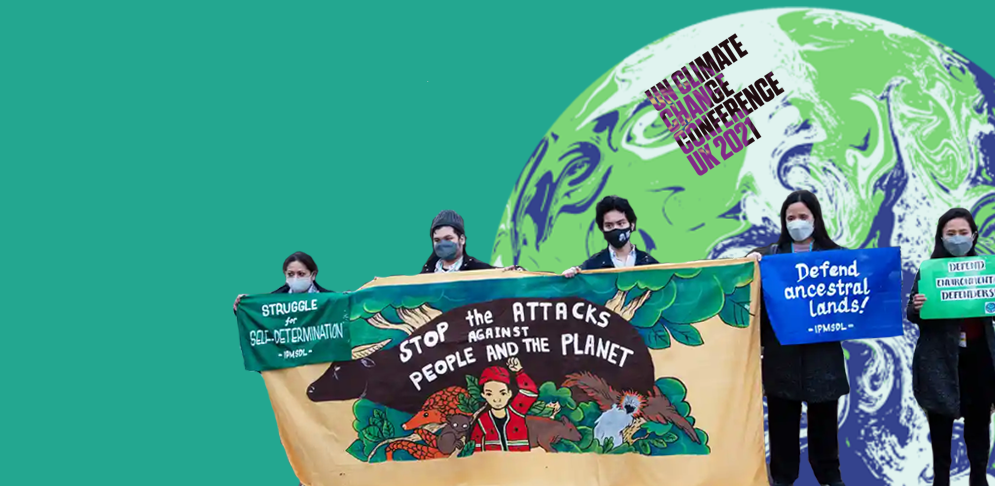
Global South social movements and civil society organizations during COP26 call to end the attacks on the people and the planet. / IBON International
This can be concretely seen in the promotion of community-owned and led alternative energy systems to extend rural electrification in Southeast Asia. In Myanmar, energy cooperatives and community-funded renewable energy systems provided access to townships in Shan, Karen and Ayeyarwady states that are not connected to the national grid. In East Nusa Tenggara, Indonesia, a micro hydropower power plant (MHPP) was initiated by the Lukuwingir and Waimbidi villages. In the Philippines, community-based renewable energy systems (CBRES) are established with the help of Sibol ng Agham at Teknolohiya (SIBAT), a civil society organization that works with people’s organizations and local government units to set-up micro-hydro and wind power projects. Pooled finances, resources and labor enabled the people to set-up energy systems that are affordable, democratically-owned and maintained, and allows for capacity development and economic opportunities.
Putting people at the center
An alternative framework forwarded by social movements in the global South is people-powered climate action, which aims to reclaim the agency of Southern peoples over their own trajectories that are currently largely driven by dominant development paradigms forwarding donor and corporate interests. People-powered climate action forwards a rights-based and people-centered approach, based on the principle of common but differentiated responsibilities and respective capacities, the right to development and gender justice. This framework is able to highlight the intersections of climate and issues of conflict, inequality and development, as well as the historical responsibility of donor countries and corporations in providing reparations to the global South.
In ensuring climate justice for the peoples of Southeast Asia and the rest of the global South, there is a need to exact the accountability of those most responsible for the current climate crisis, while also putting people at the center of adaptation and mitigation initiatives. Donor countries and corporations have to meet and exceed their pledges, allow for localized efforts to respond to the climate crisis, and pursue steps to decolonize the system that continues to degrade the environment and violate peoples’ rights. Only with the decolonization of the current financial structures and the localization of climate and development initiatives will ensure that the frontline communities most impacted by the climate crisis are at the center of the climate response.
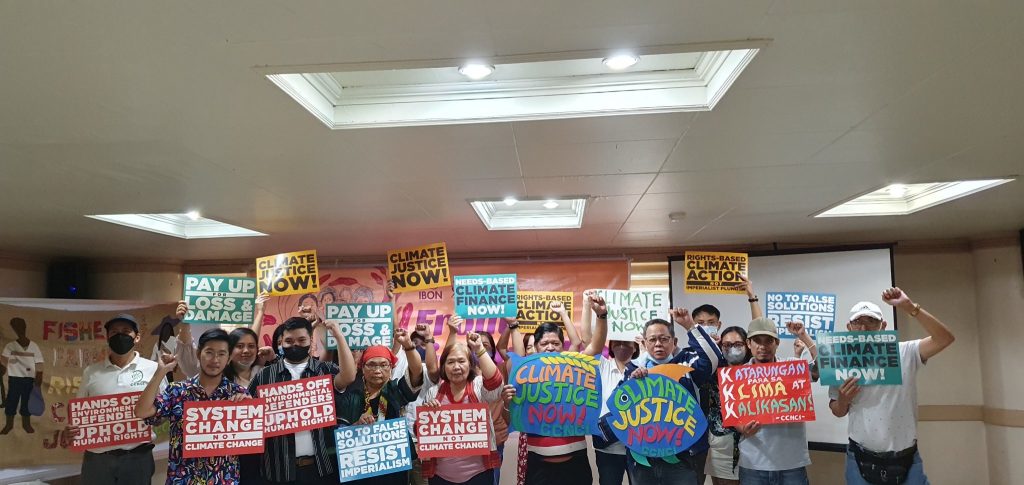
Frontline communities from the global South call for climate justice. / IBON International Climate Justice Program
Reality of Aid-Asia Pacific will be discussing this article during the webinar, “Climate alarm in Southeast Asia: Decolonizing climate financing and supporting activists” happening on October 10, 2023, 12 PM Berlin / 3 PM Manila. This webinar is organized by Stiftung Asiahaus and philippinen büro eV.
Register for the event here and find more details about the webinar here.

